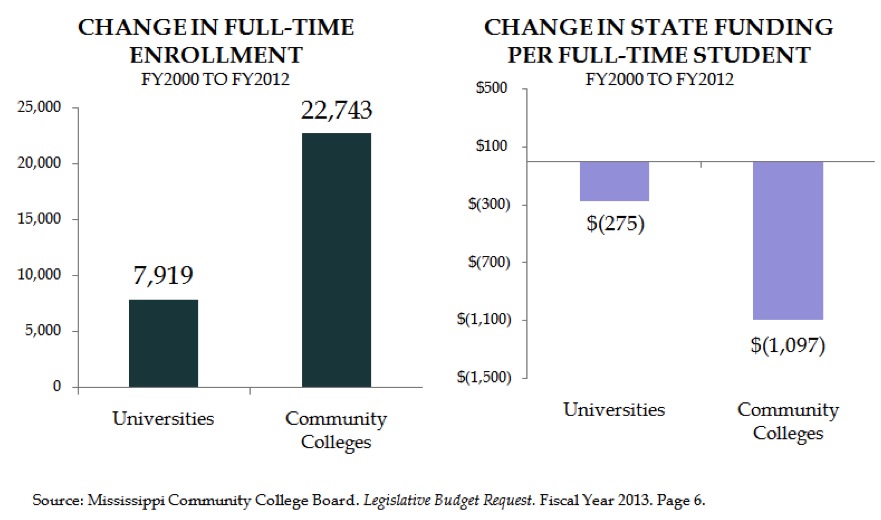HOUSE COMMITTEE REPORT: Community College Appropriations
February 3rd, 2012
On February 1st, the House Appropriations Committee heard testimony from the Mississippi Community College Board as they made funding requests for FY2013. Dr. Eric Clark, the Community College Board’s Executive Director, noted that the trend of growing enrollment and additional financial need continues for the colleges and across the education spectrum. Dr. Clark noted the colleges “can’t do more with less indefinitely.
The chart below illustrates that both colleges and universities have seen growth in full-time enrollment since FY2000 and declines in per-student funding.
MID LEVEL FUNDING
The community college leadership outlined two critical priorities in the hearing. First, to advance toward the Legislature’s Mid-Level Funding formula that promises to fund community colleges at the mid-point between per student funding at universities and K-12 schools.
To advance in full to Mid-Level Funding the colleges would need an additional $154 million above prior year funding, but the colleges’ final request is to move to ½ that amount- equal to a request of an additional $77 million in FY2013. Neither the Legislative Budget Recommendation nor the Executive Budget Recommendation includes increases in funding for community colleges.
CRITICAL REQUEST: DROPOUT RECOVERY FUNDS
Importantly, the Community College Board also asked the committee to increase the annual appropriation for Dropout Recovery Funds. Dropout Recovery Funds are resources to enhance the delivery of Adult Basic Education and GED courses offered on the 15 community college campuses.
The goal of additional resources is to increase the number and success of students enrolled in GED preparation, increase support services –child care, tutoring, transportation, mentoring- and integrate job skills into GED curriculums.
In total, the Board is asking for $11.5 million to enhance the delivery of ABE/GED programs, promote more students to college-readiness and equip them with the skills they need to enter and succeed in the workforce.
Dropout Recovery Funds represents an opportunity for Mississippi to raise the job skills, college-readiness, and employment outcomes for the 350,000 adults over 25 years old in the state without a high school credential. In an environment where Mississippi still has unemployment above 10%, adults without a high school degree are disproportionately likely to enter periods of unemployment.
Finding the resources to support efforts such as those proposed through Dropout Recovery Funds should be a priority.
Author: Sarah Welker, Policy Analyst






